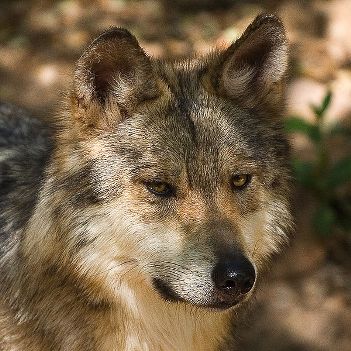In the News: Groups Rally In ABQ For Mexican Gray Wolf Releases (Letters Needed!)
 Albuquerque activists want the U.S. Fish and Wildlife Service to release more captive Mexican gray wolves into the Southwest.
Albuquerque activists want the U.S. Fish and Wildlife Service to release more captive Mexican gray wolves into the Southwest.
About four dozen people* gathered outside the agency’s regional headquarters in downtown Albuquerque on Friday. They were armed with banners and paper wolf masks. “¦
Steve Capra is director of the New Mexico Wilderness Alliance. He says there’s “huge frustration” with the agency when it comes to wolf recovery.
The last time managers released a new wolf to the wild was 2008.
Agency spokeswoman Charna Lefton says “¦ more than 95 percent of the animals currently in the wild in Arizona and New Mexico were conceived and born in the wild.
*We counted over 60 people – website editor’s note
*****************************************************************************
Please help keep the pressure growing to get Mexican wolves released into the wild-write a letter to the editor today! Dr. Tuggle promised to release more wolves into the wild last year, and it didn’t happen. Let’s keep the pressure on him to keep that promise this year!
The letters to the editor page is one of the most widely read, influential parts of the newspaper. One letter from you can reach thousands of people and will also likely be read by the U.S. Fish and Wildlife Service. Tips for writing your letter are below, but please write in your own words, from your own experience.
Letter Writing Tips & Talking Points
Below are a few suggestions for ensuring your message gets through clearly-your letter will be most effective if you focus on a few key points, so don’t try to use all of these. If you need additional help or want someone to review your letter before you send it, email it to info@mexicanwolves.org:
- Start by thanking paper for their coverage of this important issue-this makes your letter immediately relevant and increases its chances of being published.
- Urge the U.S Fish and Wildlife Service to end the freeze on more releases of captive wolves into the wild. Releases of captive wolves must happen now to prevent another extinction in the wild; the number of wild wolves must increase to reduce their vulnerability to inbreeding, natural catastrophes, disease, and other threats.
- Remind people that the Fish and Wildlife Service’s own 2010 annual progress report, released in late January, states that “lack of appropriate initial releases and successful translocations from captivity” contributed to “fewer known adult wolves available for pair formation.” This acknowledgment was accompanied by a pledge to “replac[e] the individual animals lost through initial releases and translocations” (p. 29).Director Tuggle must keep his promise to release more wolves into the wild.
- Encourage the U.S Fish and Wildlife Service to use all the means available to them to expedite more releases of captive wolves into the wild. The agency has been sitting on an Environmental Assessment that can end the ridiculous rule prohibiting new releases into New Mexico and letting wolves eligible for release into both Arizona and New Mexico sit in captivity. The stalling has to stop.
- Convey how important new releases of wolves into the wild are to increase the population’s numbers and genetic health– A population of 58 wolves is still extremely small and at risk from threats such as disease, inbreeding, or events like the Wallow Fire, which burned through Mexican wolf habitat last year.
- Explain that there are wolves in captivity ready to be released and wolves in the wild that do not have mates; these wolves need more releases to form new breeding pairs and families.
- Talk about your personal connection to wolves and why the issue is important to you. If you’re a grandmother wanting your grandchildren to have the opportunity to hear wolves in the wild, or a hunter who recognizes that wolves make game herds healthier, or a businessperson who knows that wolves have brought millions in ecotourism dollars to Yellowstone, say so.
- Reiterate the ecological benefits of wolves to entire ecosystems and all wildlife. Wildlife biologists believe that Mexican wolves will improve the overall health of the Southwest and its rivers and streams — just as the return of gray wolves to Yellowstone has helped restore balance to its lands and waters.
- Keep your letter brief, between 150-300 words.
- Provide your name, address, occupation, and phone number; your full address, occupation, and phone number will not be published, but they are required in order to have your letter published.
This article appeared in the Albuquerque Journal; you can submit your letter here.
Thank you for taking the time to submit a letter. The many letters to the editor expressing support for Mexican gray wolves published in the last year have made a real difference!
Want to make sure you know about the next rally? Join our email list for news and updates here.
Mexican gray wolf photo courtesy of C. Morrison



